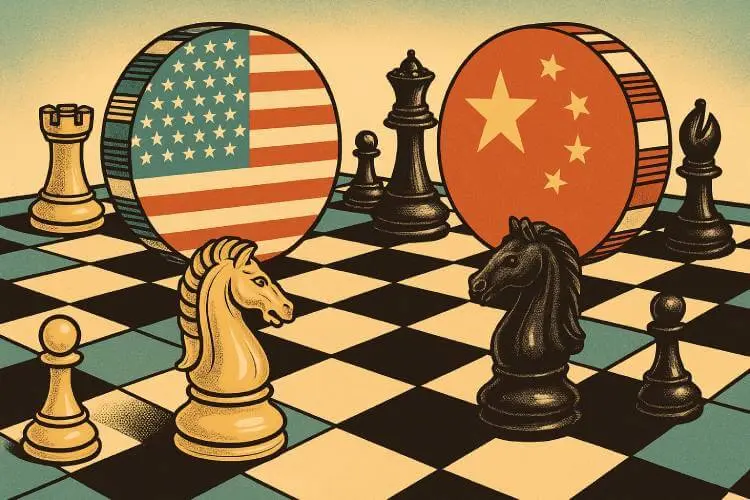US Casino Operators in Macau Facing Rising Geopolitical Pressure


As U.S.-China trade tensions continue to simmer, operators of American casinos in Macau are starting to feel the heat. A new report from Fitch Ratings outlines how major firms like Las Vegas Sands, Wynn Resorts, and MGM Resorts International could be caught in the crossfire of worsening geopolitical relations. The warning doesn’t suggest immediate disruption but highlights growing uncertainty for companies heavily reliant on Macau's gaming sector.
Fitch Ratings Flags Geopolitical Exposure
Macau’s economy heavily depends on gambling, with gaming taxes making up around 80% of its public revenue. U.S.-based operators Las Vegas Sands, Wynn, and MGM are responsible for over half of Macau’s gross gaming revenue. These firms aren’t just players in the local market but essential to it.
The dependence goes both ways. In 2024, Las Vegas Sands pulled in 63% of its global revenue from Macau operations. Wynn came in next at 52%, while MGM reported 23%. These numbers highlight the region's financial significance and explain why even small regulatory shifts or diplomatic fallouts could cause headaches for corporate leaders back in the U.S.
A Look at China’s Retaliation Playbook
The Fitch Ratings report doesn’t suggest that U.S. operators are being directly targeted, at least not yet. However, it draws attention to Beijing’s track record of regulatory retaliation during diplomatic disputes. Chinese regulators have previously tightened rules or launched probes against foreign firms, sometimes in response to geopolitical disputes rather than business issues.
One example was in 2017, when China took action against South Korean businesses over the THAAD missile defense system. Those actions didn’t involve direct bans but included indirect pressure, such as increased inspections and negative publicity.
This history raises questions for U.S. casino operators. Even if they’ve avoided scrutiny so far, there’s always the possibility that Macau’s regulators could take a stricter stance if broader tensions escalate. Fitch’s takeaway is cautious: the risk is real, but the industry isn't in crisis mode, yet.
Are Forced Sales on the Table?
Some analysts worry about the worst-case scenario: the loss of gaming licenses for the three American firms are valid until 2032. If those licenses were revoked or not renewed, companies might have no choice but to sell their Macau operations. Fitch calls this outcome “highly unlikely,” particularly in the short to medium term.
Why? Macau’s economy is still deeply tied to gambling. The local government also benefits from having foreign operators with the financial strength and experience to attract high-spending visitors. These U.S.-based firms have also invested in non-gaming projects like hotels, entertainment, and conference venues to align with Macau’s economic diversification goals.
In short, cutting ties with them would do more harm than good, at least for now.
Market Conditions Add Another Layer of Risk
Outside of politics, another challenge lurks in the background: China’s economy is slowing down. A sluggish property market and broader uncertainty have hit consumer spending, which could impact tourism to Macau and, in turn, gaming revenues.
Macau’s casino operators are in a better position than many, thanks to strong balance sheets and some diversification. However, even resilient companies could feel the squeeze if macroeconomic conditions worsen.
Fitch also notes that while stimulus efforts from the Chinese government could provide some support, the situation remains fluid. Macau’s gaming market, tax revenue, and job creation engine could be tested if growth slows further.
Outlook: Risk, But Not Panic
Despite the risks, Fitch’s overall outlook is cautiously stable. The U.S. operators in Macau are financially healthy and have made strategic moves to remain in the region’s good graces. They’re investing in non-gaming areas, adapting to regulatory expectations, and continuing to generate massive revenue for themselves and the Macau government.
That said, the situation isn’t without its risks. The political backdrop between Washington and Beijing remains unpredictable. Any new tariffs, sanctions, or diplomatic clashes could quickly increase the pressure. For U.S. casino companies, maintaining a low profile and staying aligned with Macau’s development goals will likely be the best course of action.
Final Thoughts
The message from Fitch is clear: U.S. casino operators in Macau are walking a geopolitical tightrope, but they’re not about to fall off. The focus is on adapting and preparing for possible disruptions without assuming the worst. Forced exits are unlikely, but it pays to be prepared in today's climate.
Source: Yogonet
Was this article helpful?
